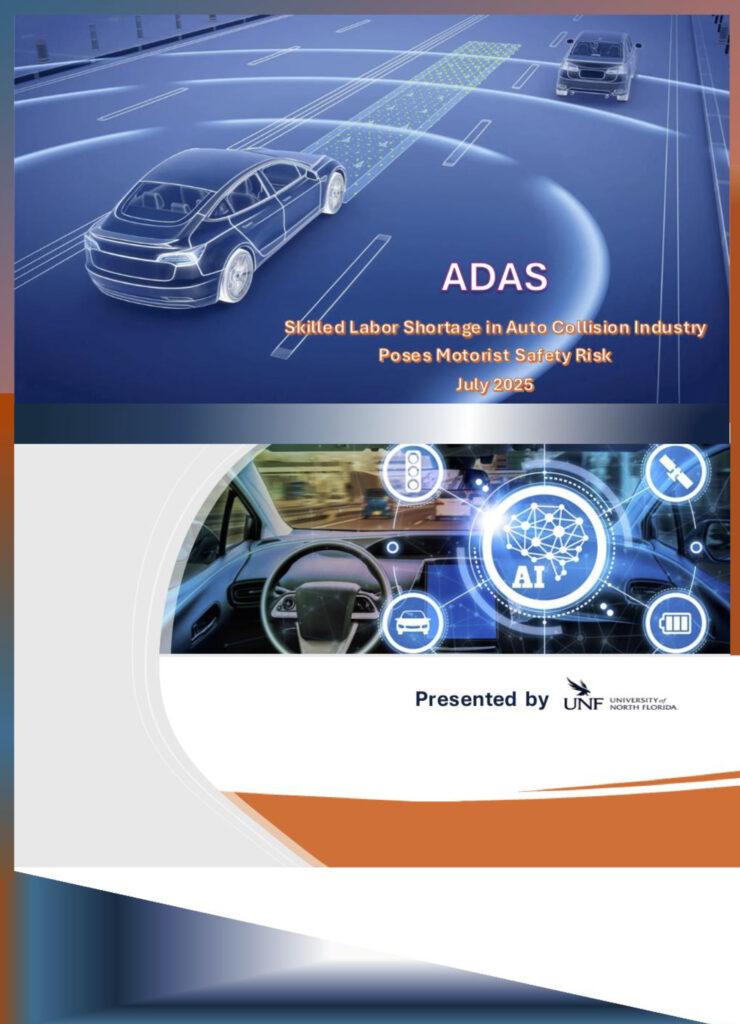The ADAS Skills Crisis: What Every Shop Owner Needs to Know About the Technician Shortage
A groundbreaking study from the University of North Florida has quantified what collision repair professionals have suspected for years: we’re facing a critical shortage of qualified ADAS technicians that directly impacts motorist safety. The research, conducted by Dr. Pingying Zhang and Dr. Debbie Wang, surveyed 304 collision repair businesses across the United States and uncovered alarming gaps in ADAS service capabilities.
The Numbers Tell a Sobering Story
The data reveals a industry at a crossroads. Of the 304 businesses surveyed, only 72 reported having dedicated ADAS technicians on staff. That means 76% of shops are operating without specialized ADAS expertise – a staggering figure when you consider that virtually every vehicle entering your bay today contains some form of advanced safety technology.
Even more concerning? Among those shops with ADAS technicians, only 42 reported their technicians had received formal OEM training. The remaining 30 relied on informal, on-the-job training methods. For an industry where precision calibration can mean the difference between a properly functioning automatic emergency braking system and a preventable collision, these numbers should serve as a wake-up call.
Small Shops Bear the Biggest Burden
The research confirms what many independent shop owners experience daily: small operations are disproportionately affected by the ADAS skills gap. Nearly half of surveyed shops (49.7%) were independent, single-location operations, with 64% of these employing five or fewer technicians. Among these smaller shops, only 14 had access to OEM-trained ADAS specialists.
This isn’t just a staffing challenge – it’s a fundamental threat to business sustainability. As Dr. Zhang and Dr. Wang note, the complexity of servicing ADAS systems across multiple vehicle brands has created an impossible situation for many shops. 70% of surveyed firms reported it’s not realistic for a single technician to effectively service ADAS systems across 30 different vehicle brands – the typical range seen in U.S. collision repair facilities.
The Sublet Solution: Short-Term Fix or Long-Term Strategy?
Faced with these constraints, shops have developed a two-pronged approach: performing pre/post scans in-house (77% of shops) while outsourcing ADAS calibrations to third-party providers (65% of shops). This division reflects the varying levels of investment and expertise required – calibration demands specialized tools, controlled environments, and brand-specific knowledge that many shops simply cannot maintain across dozens of manufacturers.
The research raises critical questions about this widespread reliance on subletting. While it provides immediate access to needed capabilities, the quality and consistency of outsourced ADAS calibrations remain unmeasured. Previous Insurance Institute for Highway Safety (IIHS) research cited in the study found that approximately 50% of vehicle owners reported post-calibration issues – regardless of whether work was performed at independent shops or dealerships.
What This Means for Your Shop
The implications are clear: the ADAS technician shortage isn’t a future problem – it’s today’s crisis. Every shop must decide whether to invest heavily in training and equipment for multiple brands, rely on sublet arrangements with uncertain quality controls, or partner with technology providers who can bridge this capability gap.
Michael Quinn and Fred Iantorno from AirPro Diagnostics, who provided industry insights for the research, understand these challenges intimately. Their contributions helped researchers connect academic findings to real-world shop floor realities, ensuring the study reflects the actual pressures repair professionals face daily.
The Path Forward
This research doesn’t just document a problem – it quantifies the urgency for action. With ADAS-equipped vehicles now representing the majority of the repair market, shops can no longer treat these systems as optional services. The choice isn’t whether to develop ADAS capabilities, but how to acquire them efficiently and reliably.
The study’s findings underscore why remote diagnostic services and brand specialist support have become essential tools for shops navigating this complex landscape. When a single technician cannot realistically master 30 different ADAS platforms, accessing remote expertise becomes not just convenient but critical for safe, complete repairs.

Download the Complete Research
The full University of North Florida study, “Skilled Labor Shortage in Auto Collision Industry Poses Motorist Safety Risk,” provides detailed analysis, comprehensive data visualizations, and specific recommendations for addressing the ADAS technician crisis. This 26-page report represents the most thorough examination of ADAS workforce challenges to date.
Download the Complete ADAS Workforce Study to access:
- References and additional resources
- Complete survey methodology and sample demographics
- Detailed correlation analysis of service delivery models
- Full recommendations for industry stakeholders
- All charts, tables, and statistical findings
Special thanks to Dr. Pingying Zhang and Dr. Debbie Wang of the University of North Florida for their rigorous research, and to AirPro Diagnostics team members Michael Quinn and Fred Iantorno for providing crucial industry context and insights that shaped this important study.
